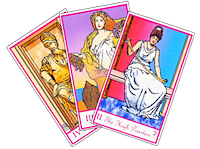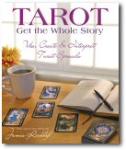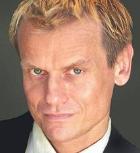By Melanie Marquis
"The most important thing for me is to know that I am helping people improve their lives," explains James Ricklef. A Certified Tarot Master, award-winning author, and creator of the Tarot of the Masters deck and The Original Tarot Coloring Book, James has helped countless people do just that, but he's not about to stop striving to reach new audiences. Author of Tarot Affirmations, Tarot: Get the Whole Story (Llewellyn) and Tarot Tells the Tale (Llewellyn, 2004), which gained recognition as first runner-up in the General Interest category at the 2004 COVR awards, James is now sharing his tricks and techniques with an eager online crowd, offering webinars on both popular and not-so-obvious Tarot topics. He's spoken at Tarot conferences such as LATS, BATS, and the New York Readers Studio, is a familiar voice on Blog Talk Radio, and has quickly become a name to know in the world of Tarot. So as James is gearing up for another session of webinars and is contemplating a third printing of the highly collectible Tarot of the Masters, we thought this would be an excellent opportunity to get to know him a little better.
Tarot Reflections: You say that you are a 'Fortune Helper, not a Fortune Teller.' What do you mean by that?
James Ricklef: This relates to my philosophy that the future is not etched in stone. Instead, I think that a Tarot reading indicates a probable outcome. Yes, there are currents of fate that are stronger than others, but I prefer to help people empower themselves and not think they're slaves to fate. Even if there is a strong rip tide in the flow of time, you can still swim against it if you are forewarned!
TR: Your first Llewellyn title, Tarot Tells the Tale, is a bit unusual in its approach to teaching Tarot. Can you describe the format?
JR: Tarot Tells the Tale bridges the gap between the theory of doing Tarot readings, which many books explain, and the actual practice of doing them, which is rarely illustrated in other Tarot books. It features twenty-two 3-card readings and one Celtic Cross reading for famous people and fictional characters. It also includes comments on each of the readings, including notes about problems I had doing them, things I feel they teach about doing readings, and other items of interest.
TR: Do you think anyone can read Tarot, or does it take someone with higher than average intuition?
JR: I think learning to read Tarot cards is like learning to play the piano. Everyone can learn it, although some people have greater talent than others…and some people find better teachers than others. And some people practice more diligently than others.
TR: What characteristics and habits should a good Tarot reader strive to cultivate?
JR: Sincerity, honesty, compassion, professional conduct, consideration for others and a desire to help other people--those are all qualities of a good reader. A good Tarot reader also should continually learn about the Tarot and exercise and strengthen his or her intuition.
TR: You have a Tarot reader's code of ethics clearly posted on your website. Why do you think it's important to lay that all out up front?
JR: It's a good idea at least to consider what your code of ethics is because if you never think about this subject, someday you will find yourself making ethical decisions in the heat of the moment. Such snap decisions usually fall victim to the dictates of expedience and short-term self-interest. They rarely reflect the values of our higher self or an enlightened sense of purpose. So if you spend a little time and effort writing down your Tarot code of ethics, it will be there for future reference, both on paper and in the back of your mind. Of course, if you don't plan to read professionally, this may not be such an important issue, but a written code of ethics will help you set boundaries as to what you will and will not do in a Tarot reading.
TR: Do you feel there is a lot of unethical behavior going on among many professional readers?
JR: I don't know if there is a lot of unethical behavior among professional readers, but I sure know there is some. I have heard some variation of the following story several times:
'I went to a Tarot reader, who advertised cheap readings. In the course of the reading, she told me that there is a curse on me and that she can remove it, but it's very difficult so it will cost me $500.'
This is probably the most glaring example of unethical behavior. It might be just the tip of an iceberg, but I don't know how big that iceberg is.
TR: Tell me about your self-published Tarot of the Masters deck.
JR: The cards in my Tarot of the Masters deck were inspired by classic paintings by old masters, such as Toulouse-Lautrec, El Greco, and Rubens. In preparation for creating this deck, I perused hundreds of works of art in order to find ones that would suit the seventy-eight cards of the Tarot. Then to create each card, I did a pen and ink line drawing by hand, which I then scanned into my computer and colored using free art software.
Creating my own deck was an incredible experience, a total labor of love, and the process itself meant a lot to me. And of course a deck that I created myself has a very deep and powerful connection to my heart and soul, and using that deck gives my readings a wonderful new dimension.
TR: What do you love about Tarot?
JR: Hmm…is it okay to say everything? Seriously, I doubt that I'll be able to completely answer this question in the confines of an interview, but let me try.
When I first started to explore the Tarot, it felt a lot like falling in love. You know that infatuation period when you think about another person all the time and just can't find out enough about him or her? Well, that's kind of what it felt like. Long before I got involved with the Tarot, I had dabbled with the I Ching, but that divination tool never captured me the way that the Tarot did. Perhaps it's the beautiful pictures of the Tarot that made the difference?
As for some things in particular that I love about the Tarot…its images provide a powerful connection to our intuition (which also communicates using symbols), and also allow a unique method of communication with querents. Its connections and associations with other esoteric fields (astrology, Qabalah, alchemy, etc.) make it a wonderful doorway into those other realms of esoteric exploration. For example, before I got involved with the Tarot, I thought that alchemy was just about some medieval guys trying to turn lead into gold, and I had never even heard of the Qabalah. Its many transformations over the centuries prove its adaptability. It's a vibrant and living practice.
Its also like that old Saturday Night Live punch line: 'It's a dessert topping and a floor wax.' You can use Tarot cards for so many different things: divination readings, guided visualizations, affirmations (as I describe in my book, Tarot Affirmations), and meditation work. And I'm sure that is not an exhaustive list, by any means.
TR: Besides divination, in what other ways do you use the Tarot?
JR: I have used it a lot for affirmation work. I also sometimes do guided visualizations into the cards in order to explore their esoteric wisdom. And I am currently working on a new book, provisionally called Tarot and Your Spiritual Path, that discusses ways that the Tarot can help us along our spiritual journey. It introduces spreads to show you how to live a more spiritual life and how to find spiritually oriented guidance. It also provides readings in which the Tarot gives answers for spiritual questions such as 'What are love and compassion?'
TR: You've taught Tarot for a while, and you recently began doing Tarot webinars--how does teaching an online Tarot class compare to teaching a Tarot class in person?
JR: The main difference is the limited amount of student feedback possible in a webinar. At least, in the webinar venue I'm using at this time, student feedback is typed in rather than spoken. I was afraid that this would be a bit stifling, but it turns out not to be a big problem. It just makes people think a little more about expressing their feedback succinctly. It also turns out to have an unanticipated benefit in that more gregarious students are less likely to dominate the conversation in a webinar. In face to face classes sometimes the shyer or more reticent students find themselves intimidated from participation, but in my webinars that has not been the case.
TR: How does a webinar work exactly?
JR: My webinar classes are live, and I use http://vyew.com/site/. This website allows me to talk to the students through a headset with a mic, and I can use a virtual white board too. Concurrently, the students use a sort of chat room facility to type in their responses. This site also allows them to use a headset and mic if they have one, but I prefer to disable that option if some of the students don't have a mic since that would put them at a disadvantage.
TR: You participate in a lot of Tarot conferences, speaking at LATS and the New York Readers Studio and other events. What is that like?
JR: It's great; I love it. The learning aspect of all the workshops at these events is an obvious benefit, but you learn so much through informal chats with all the other people there too. In fact, it may be the social aspects that I get the most out of now. The world we live in is chock full of 'muggles' and it's such a wonderful change to spend some time now and then surrounded by people who share this interest. Or as Thalassa, the organizer of the Bay Area Tarot Symposium puts it, it's 'the gathering of the tribes.'
TR: In what direction do you feel tarot is heading?
JR: It's interesting that you ask that, because in my interview with Thalassa, whom I just mentioned, I asked her a similar question. That was over a decade ago, but some of the things she said are still relevant today. For example, she said: 'I would like to see Tarot have a greater degree of legitimacy, less of a stigma.' I think that's happening more and more now. For example, on her blog, Mary Greer keeps a list of Tarot's appearances in the media. And this is just movies and TV. Her list doesn't even touch on other types of pop culture, such as comic books, which are featuring Tarot cards more and more these days. In addition, I know that Robert Place has been doing some wonderful work creating Tarot exhibits and lectures in museums all across the country. Here in Los Angeles, his Tarot exhibit at the Craft and Folk Art Museum (which is located in the heart of Museum Row) opened about a month ago. I attended the exhibit's opening night, and someone who works there mentioned that the turnout was far greater than they had expected. So that's another way that the general public is getting some great exposure to the Tarot.
In my interview with her, Thalassa also talked about getting past, 'the weird image that movies and TV continue to foster.' She explained, 'There's so much smarm still attached to "the fortune telling image" that we really have to work hard to change that image.' This statement was made in 1999, at which time the internet was just beginning to make positive information about the Tarot easily available. The best site at that time was Joan Bunning's http://learntarot.org/, and that's still a great site. But now, more than a decade later, we have a vast proliferation of websites with great Tarot information. We have excellent resources like Tarotpedia and Aeclectic Tarot, we have a gazillion Tarot blogs, and we have internet podcasts and radio programs. Also, virtually every Tarot sage has his or her own informative website. Besides Mary Greer, there's Rachel Pollack, Lon DuQuette, Robert Place, etc., etc.
Another thing that I see as a continuing Tarot trend is the move away from fortune telling and into all the other uses: 'fortune helping', visualizations, affirmations, and meditations. And fine art, too. For example, Nikki St. Phalle's Tarot sculpture garden has been around since 1998, and I recently discovered that a local art gallery, the Santa Monica Museum of Art, had an exhibit of Tarot related art earlier this year.
TR: What would our readers be surprised to learn about you?
JR: I have my Master's degree in Engineering.
TR: Do you consider yourself psychic?
JR: Oh, this is a much more complex question than people think. In general, I think everyone is psychic to some extent. It's like the ability to sing. Many people say that they can't sing, but everyone can to some degree. However, I believe that psychic abilities that are powerful and dependable enough to be reliably effective and useful in readings are pretty rare, and what most people use is intuition. Those two things are often confused so let me explain how I see them as being different.
Psychic is when you 'know' something that you couldn't possibly know through mundane means. For example, the night that my father died, I felt his passing. He had cancer and had been doing badly for a month, so it was just a waiting game at that time. But that particular night, I suddenly was overwhelmed with a feeling of sadness. And it was interesting that this sadness was about how my mother was going to be left all alone, which I'm sure was what my father was feeling as he passed away. Yes, I had known for a while that my father was at death's door, but that intense feeling only hit me on that specific night and not any other night during his long illness, so that was a flash of psychic insight.
Intuition, on the other hand, accesses knowledge from unseen depths of your subconscious mind. That knowledge already exists within us, but we have a hard time accessing it without help, which is what Tarot cards do. And an intuitive solution is one that comes to us from a subconscious process rather than a conscious one, but it does come from our minds. At least, that's my current understanding of all this, which might change tomorrow.
For example, there is the whole question of how much of what we see in a reading comes from our subconscious and how much from the Universe, and I can't answer that. Does the Universe give us information or does it help us access insights from our subconscious mind? I don't know, but I also think it doesn't matter if I know, because it's the results that matter, not pinning down the mechanism of the process.



